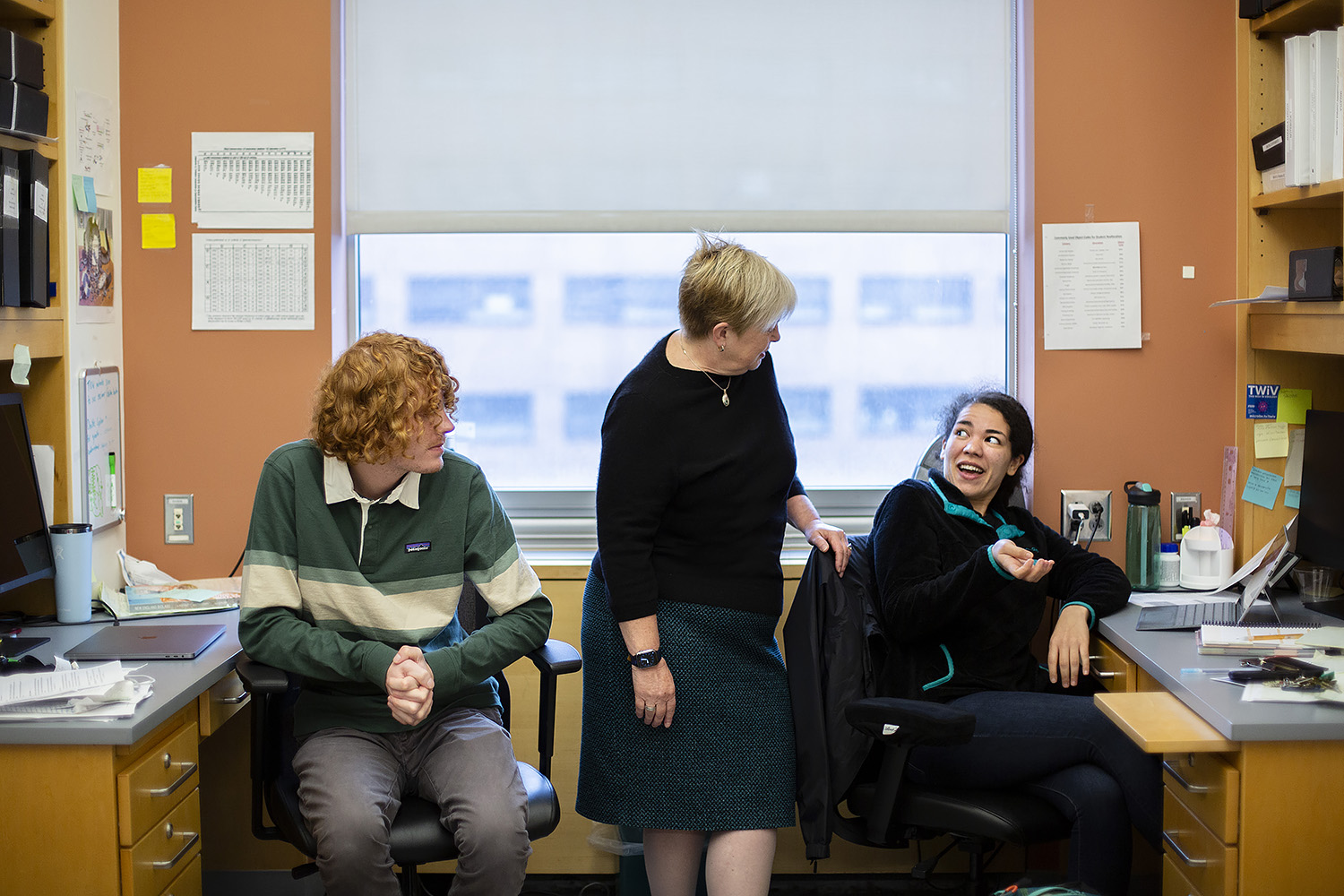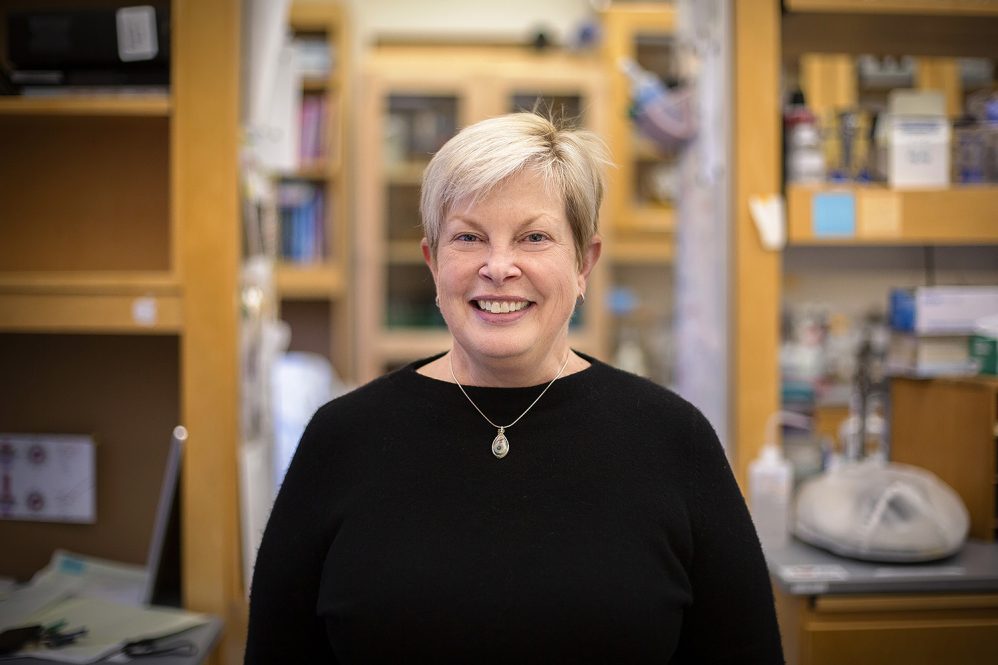As a UConn professor for the past 28 years, Carolyn Teschke has helped countless students find the same joy in biology and chemistry that she discovered as an undergraduate herself. Now, as the new head of the Department of Molecular and Cell Biology, she hopes to provide a welcoming and inclusive environment where all students and faculty can achieve success.
We caught up with Teschke to learn about her goals for the department and what she sees as the future of her field.
Why is it important to study molecular and cell biology?
Most of our world’s problems involve aspects of biology. We only need to look at the recent pandemic to see the role of molecular and cell biology research in everyday life. The COVID-19 vaccine that saved so many lives was based on years of basic molecular biology research, including how to stabilize the mRNA and get it across membranes into the targeted cells. The advances we have made for treating diseases like cancer are generated from basic research aimed at understanding how cells function and then taking that basic knowledge to develop therapeutics that target the molecular pathways affected by the disease. We are also considering the effects of climate change on all species, and some of those are at the molecular level. Personalized medicine is based on fundamental research into genomes. Gene editing is now being used to treat some inherited diseases as well as to control mosquitos to prevent mosquito-borne diseases. And the role of microbiomes in health… The list is endless.
Tell us about your research.
The major project of my research group is to understand how infectious viruses are built from their component proteins. We use a bacterial virus (called a bacteriophage) as a model system for these studies. Our main model is bacteriophage P22, which has a similar assembly pathway and proteins to that of the herpesviruses, but it is much easier to work with. Thus, researchers studying complicated animal viruses, like herpesviruses, can apply what we learned from our model virus to their system to help them with antiviral development. Our goal is to understand these complex assembly reactions in molecular detail. For instance, we make mutations in the virus’ proteins and determine the effect on the assembly of the virus, both within an infected cell and in experiments with pure proteins. We also investigate the effect of the mutation on the structure of the protein and relate that back to its function. Bacteriophages are also used in “phage therapy,” where phages are used to treat antibiotic resistant bacterial infections, and we do some research to develop this as well.

What’s one goal you have for the Department of Molecular and Cell Biology (MCB)?
One goal I have for MCB is that we provide an environment that is conducive for our faculty, staff, trainees and students to be successful, as they define success for themselves. Everyone is on a different life journey, and I want MCB to be inclusive and welcoming for all.
What’s one thing you want students to know about your department?
For all our trainees and students, please know that we are invested in your success. Please also recognize that molecular and cell biology is a challenging field, covering a broad diversity of topics. Having the mindset that struggle is part of the process can help you manage learning this field. Sometimes you may not do as well as you hoped on an exam, or experiments will fail, but these setbacks do not mean that you are a failure. Go and talk with your TAs, instructors or advisors. They are your best resources and support.
What’s the biggest misconception about your field?
People think that the answers to current problems should already be known, but there are no magic bullets. Science is hard, and it can take a long time for solutions to emerge from fundamental research. For a current example, we have a deep knowledge about some viruses, but SARS-CoV-2 (the coronavirus that causes COVID-19) was a new virus, and we had to start at the beginning. Thankfully work on coronaviruses had been done prior to the pandemic, so we did not need to start at zero. I am amazed at the rate of progress in understanding this virus — but it still presents puzzles for scientists.
We also need social buy-in of science by the public and the press. Vaccines work, masks work, and climate change is real. Scientists are not necessarily good salespeople, and we need to improve our communication with the public because social acceptance of science is crucial for society, every day.
Everyone is on a different life journey, and I want the Department of Molecular and Cell Biology to be inclusive and welcoming for all.
How has the department changed since you first joined?
We are much more multidisciplinary now than when I started in 1994. Interdisciplinarity is also valued by funding agencies, and the questions molecular and cell biologists ask now are often best answered with diverse teams. The questions we ask become ever more complicated because research is always based on prior research, and I have certainly seen this over my career.
Where do you see the field going in the next 10-20 years?
I think we’ll see more integration of artificial intelligence (AI) and big data into biology. There’s a great example right now called AlphaFold. This AI-based program predicts the fold of a protein based on the amino acid sequence and is pretty accurate in blind tests. When I was a beginning biochemist studying protein folding, doing this was the “holy grail.” Big data is going to affect the way we treat diseases and will be part of the personalized medicine future. Already scientists have discovered subtle changes in genomes that can lead to diseases by looking through many people’s genomes. Genome editing will continue to be developed and hopefully become a truly useful tool for correcting diseases and for answering fundamental questions about how cells work.



